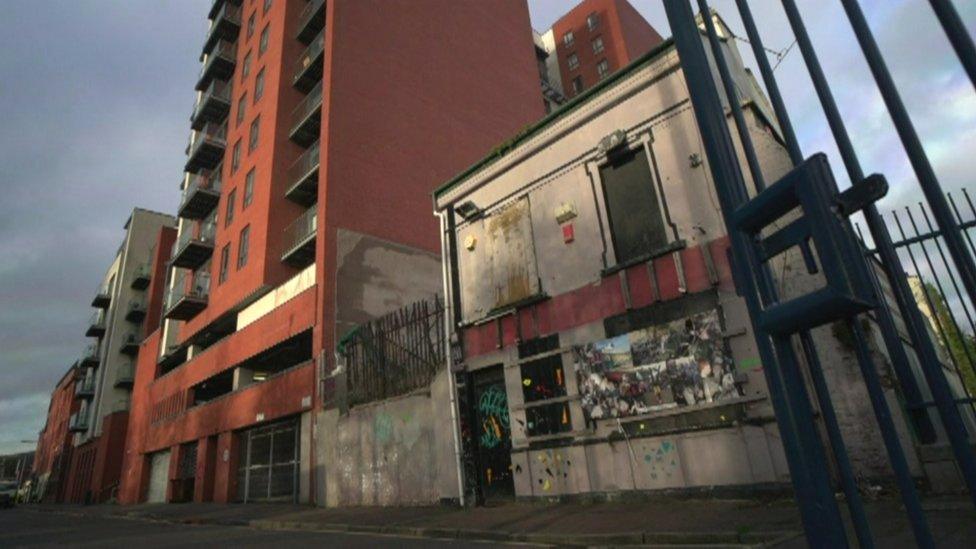The people trying to crack the planning puzzle
- Published

The former Rotterdam Bar could be knocked down to make way for apartments
Retired teacher Michael McCurley has lived in his Belfast home for 30 years.
It backs on to the King's Hall - the site of a major development. His opposition to it has become a big part of his life.
And his attempts to have his voice heard in the planning process has left him disillusioned.
Michael is worried about getting safely in and out of his home's driveway - which sits right beside a site access road.
He's found it difficult to raise his concerns effectively - working out the best way to present them and to whom.
He described hours on the phone, often to the wrong person, before he's redirected elsewhere.
"It's very daunting, very difficult. It has been a nightmare. I feel as if I have become a lonely voice and a bit of a thorn in the developers' side, but no more than that," he said.
The developers have said there was lots of public consultation, they amended their plans as a result and they've tried to address ongoing concerns.

Michael McCurley is concerned about safely getting in and out of his driveway
Planning is a complex area that people find difficult to navigate.
Research by Queen's University academics recently found little public confidence in the process.
Now, Infrastructure Minister Nichola Mallon is trying to improve people's experience.
She has asked experts to advise her on how things could be better.
'No right of appeal'
One of the groups that will contribute is an organisation called Community Places.
A small, not-for-profit operation, it provides independent planning advice to individuals and communities.
Director Colm Bradley said the system is daunting and favours developers.
"So if a developer is unhappy with a decision that planners and councils make they can appeal," he said.
"But if a community is unhappy on genuine planning grounds, they've no right of appeal.
"Why is that, why should that be the case?"
He said citizens need a grasp of complex planning law, an understanding of technical language and the time to do their own research - all of which are obstacles to participation.

The Rotterdam Bar was once a well-known live music venue
In a narrow complex of streets by the docks in Belfast, plans for a tower block are being opposed.
It's planned that two former Belfast bars - Pat's Bar and the Rotterdam, both once major live music venues - will be knocked down to make way.
'Travesty towers'
Terry McKeown, of the Sailortown Regeneration group, said the planned 30-story development will dwarf existing buildings and dominate the area.
She calls it "Travesty Towers" and said locals want homes, shops and services to help build their small community.
She found out about the proposal when she saw a notice attached to a tree, and said planners need to come to communities and discuss proposals with them rather than engaging in "tick box" consultation.
The firm behind the development said it consulted the public and that the views expressed will be considered as part of the formal planning application.

Terry McKeown has dubbed the project "Travesty Towers"
But for Terry, more should be done to facilitate people having their views heard.
"Have a team in planning whose job it is to go out and talk to people on their doorsteps, not just have an application reference number where people have to do their own legwork and they have to learn the language.
"That's time consuming, it requires a certain amount of expertise within the planning system. The ordinary person in the street doesn't have that."